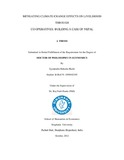Please use this identifier to cite or link to this item:
http://archive.nnl.gov.np:8080/handle/123456789/137| Title: | Mitigating climate change effects on livelihood through co-operatives : building a case of Nepal |
| Authors: | Karki, Gyanendra Bahadur |
| Keywords: | Climate change Cooperatives Cooperative movement |
| Issue Date: | 21-May-2018 |
| Abstract: | Climate change is hitting hard the countries with poor and weak economies. Most developing countries and the poor have been most vulnerable as they depend on climate sensitive sectors like agriculture. The process of adaptation is always constrained by the institutional, social, economic, and political environment in which people must operate. The climate change has brought complexities and more challenges in the developing world including Nepal. These issues have made careful engagement of multiple decision makers in the development and implementation of adaptation strategies. The statement of the problem was devised as the extent of impacts of climate change in sustainable livelihood and response through cooperative movement including vulnerable groups like poor, marginalized, Dalit and excluded people. The purpose of the study was thus to assess the current trend of climate change, resulting impact on livelihood and impacts of co-operative movement towards sustainable life. The literature review was carried out making the thematic review, theoretical review, and contemporary research studies. The review was concluded by making conceptual model of conceptual framework for the purpose of the study. This study was exploratory cum descriptive research based on qualitative and quantitative research approaches. The validity of this research was enhanced by the extensive and participatory nature of the investigations. The reliability of the study was ensured with multiple source of evidence, which leads to triangulation of data, the detailed, rich and thick descriptions of the researcher’s own assumptions and position in the study, and ultimate conclusions. The present study has devised a model for policy option in the field of mitigating climate change, and improvement of livelihood through micro cooperative movement. The study reflected about different emerging themes from the grounded settings. The livelihood setting demonstrated diversity in family composition, education as a lever for promoting employment, rising trends of saving, crisis of food security and agro production, cooperative movement for livelihood improvement, declination of quality life and climate change. The impacts of climate change directly and indirectly threatened to livelihood. The assessment of climate change impacts illustrated about shift in season, weather change, variation in green coverage, declination in water sources, changing pattern of insect adaption, changing time of flowering and ripping fruits, declining crops production, over rainfall, drought, and people’s feeling about climate change. The cooperative movement has also raised issues regarding the inclusion of the excluded groups in cooperatives, poverty alleviation versus cooperative movement, with, without and beyond cooperatives, and micro-cooperatives as an alternative platform of being together. It would be better if micro cooperative exists in future. The study concluded that micro/ primary cooperative may be the alternative platform for being together and the new approach for reaching the unreached. |
| Description: | A thesis submitted in partial fulfillment of the requirement fo rthe degree of Doctor of Philosophy in Economics, School of Humanities & Economics, Singhania University, India, 2012. |
| URI: | http://103.69.125.248:8080/xmlui/handle/123456789/137 |
| Appears in Collections: | 300 Social sciences |
Files in This Item:
| File | Description | Size | Format | |
|---|---|---|---|---|
| 18-Dr.Gyanendra Bahadur Karki_PhD.pdf | 2.84 MB | Adobe PDF |  View/Open |
Items in DSpace are protected by copyright, with all rights reserved, unless otherwise indicated.